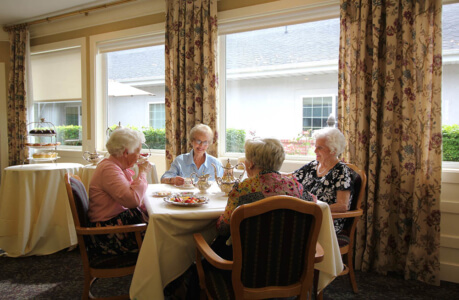
Why Choosing the Right Senior Living Center Matters
July 24, 2024
Luxurious Senior Living Communities
August 22, 2024Benefits of Choosing Assisted Home Care for Seniors

Introduction to Assisted Home Care for Seniors
Assisted home care for seniors is an increasingly popular option for elderly individuals who require support but wish to remain in the comfort of their own homes. This form of care involves professional caregivers providing personalized assistance with daily activities, medical needs, and emotional support, allowing seniors to maintain a higher quality of life while staying in familiar surroundings.
Why Assisted Home Care is Essential for Seniors
The importance of assisted home care for seniors cannot be overstated. As individuals age, they often face various health challenges and mobility issues that can make independent living difficult. Assisted home care offers a solution that ensures seniors receive the necessary support to manage these challenges safely and effectively, promoting overall well-being and longevity.
Personalized Care for Individual Needs
One of the standout benefits of assisted home care is the highly personalized nature of the service. Care plans are tailored to meet the specific needs of each individual, ensuring that they receive the most appropriate and effective care. This individualized attention helps address unique health conditions, preferences, and routines, providing a more satisfying and comprehensive care experience.
Enhanced Quality of Life
Choosing assisted home care can significantly enhance a senior’s quality of life. By receiving help with daily activities, medical care, and emotional support, seniors can enjoy a more comfortable and fulfilling lifestyle. The peace of mind that comes from knowing they are well-cared-for contributes to better mental and emotional health, leading to overall happiness and contentment.
Professional Medical Assistance
Access to professional medical assistance is a critical component of assisted home care. Trained healthcare professionals, including nurses and therapists, provide essential medical services such as medication management, wound care, and physical therapy. This level of professional care ensures that seniors’ health conditions are monitored and managed effectively, reducing the risk of complications.
Emotional and Psychological Support
Emotional and psychological well-being is just as important as physical health, especially for seniors. Assisted home care includes companionship and emotional support, helping to alleviate feelings of loneliness and isolation. Caregivers build strong, trusting relationships with their clients, offering a sense of connection and stability that is vital for mental health.
Independence and Dignity Preservation
Maintaining independence and dignity is a fundamental aspect of aging with grace. Assisted home care encourages seniors to perform as many tasks as they can on their own while providing support when needed. This approach helps preserve their sense of autonomy and self-worth, which is crucial for their overall mental and emotional well-being.
Safety and Security
Safety is a top priority in assisted home care. Caregivers ensure that the home environment is safe and secure, reducing the risk of falls and other accidents. They are trained to respond promptly to emergencies, providing immediate assistance and ensuring that seniors receive the necessary care without delay.
Convenience for Families
Assisted home care offers significant convenience for families. It relieves the burden of caregiving from family members, allowing them to focus on their own lives while ensuring their loved ones are well cared for. This arrangement provides peace of mind, knowing that professionals are handling the care responsibilities competently and compassionately.
Cost-Effectiveness Compared to Nursing Homes
Financial considerations are a major factor when choosing care options for seniors. Assisted home care is often more cost-effective than nursing homes or other institutional care facilities. It provides high-quality, personalized care without the high costs associated with residential care, making it a viable option for many families.
Customizable Care Plans
One of the key advantages of assisted home care is the flexibility to customize care plans. As seniors’ needs change over time, the care provided can be adjusted accordingly. This adaptability ensures that the level of care remains appropriate and effective, addressing any new challenges that may arise.
Support for Chronic Conditions
Many seniors suffer from chronic conditions such as diabetes, arthritis, or heart disease. Assisted home care offers specialized support for managing these conditions, including regular monitoring, medication management, and lifestyle advice. This comprehensive approach helps manage symptoms and improve quality of life.
Social Interaction and Engagement
Social interaction is essential for seniors to maintain mental and emotional health. Assisted home care encourages seniors to engage in social activities and stay connected with their community. This interaction helps reduce feelings of loneliness and isolation, promoting a sense of belonging and well-being.
Nutrition and Meal Preparation
Proper nutrition is crucial for maintaining health in seniors. Caregivers assist with meal planning and preparation, ensuring that seniors receive balanced, nutritious meals. They can also accommodate specific dietary needs and preferences, promoting overall health and vitality.
Medication Management
Ensuring proper medication intake is a critical aspect of senior care. Assisted home care includes meticulous medication management, preventing errors and ensuring that seniors take their medications as prescribed. This attention to detail helps manage health conditions effectively and avoid complications.
Physical Therapy and Rehabilitation
For seniors recovering from surgery or injury, physical therapy and rehabilitation are essential. Assisted home care provides access to these services, helping seniors regain mobility and strength. Regular physical therapy sessions promote faster recovery and help maintain independence.
Home Environment Adaptations
Adapting the home environment to meet the needs of seniors is an important aspect of assisted home care. Caregivers can recommend and help implement modifications such as grab bars, ramps, and improved lighting to ensure the home is safe and comfortable.
Family Involvement in Care
Family involvement is encouraged in assisted home care. Caregivers work collaboratively with family members to develop and implement care plans, ensuring that the senior’s needs are fully met. This partnership enhances the quality of care and strengthens family bonds.
Respite Care for Family Caregivers
Caring for a senior family member can be demanding and exhausting. Assisted home care offers respite care, providing temporary relief for family caregivers. This service helps prevent burnout and allows caregivers to take a break, ensuring they can continue to provide support in the long term.
Technology Integration in Home Care
The integration of technology in home care has revolutionized the way care is delivered. Telehealth services, monitoring devices, and emergency response systems enhance the safety and effectiveness of assisted home care. These technologies provide additional layers of support, ensuring seniors receive timely and comprehensive care.
Assisted home care for seniors offers a multitude of benefits, from personalized care and enhanced quality of life to professional medical assistance and emotional support. This care option allows seniors to maintain their independence and dignity while receiving the necessary help to manage daily activities and health conditions. For families, it provides peace of mind and convenience, knowing their loved ones are in capable hands. By choosing assisted home care, seniors can enjoy a fulfilling and comfortable life in the familiar surroundings of their home.

